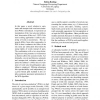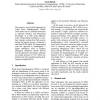111 search results - page 14 / 23 » A Concept-based Adaptive Approach to Word Sense Disambiguati... |
EACL
2006
ACL Anthology
13 years 9 months ago
2006
ACL Anthology
In this paper a novel solution to automatic and unsupervised word sense induction (WSI) is introduced. It represents an instantiation of the `one sense per collocation' obser...
ACL
2004
13 years 9 months ago
2004
We describe two probabilistic models for unsupervised word-sense disambiguation using parallel corpora. The first model, which we call the Sense model, builds on the work of Diab ...
ACL
2006
13 years 9 months ago
2006
We present a novel hybrid approach for Word Sense Disambiguation (WSD) which makes use of a relational formalism to represent instances and background knowledge. It is built using...
LREC
2010
13 years 9 months ago
2010
With the proliferation of applications sharing information represented in multiple ontologies, the development of automatic methods for robust and accurate ontology matching will ...
CIARP
2004
Springer
14 years 1 months ago
2004
Springer
We present a method for extracting selectional preferences of verbs from unannotated text. These selectional preferences are linked to an ontology (e.g. the hypernym relations foun...


